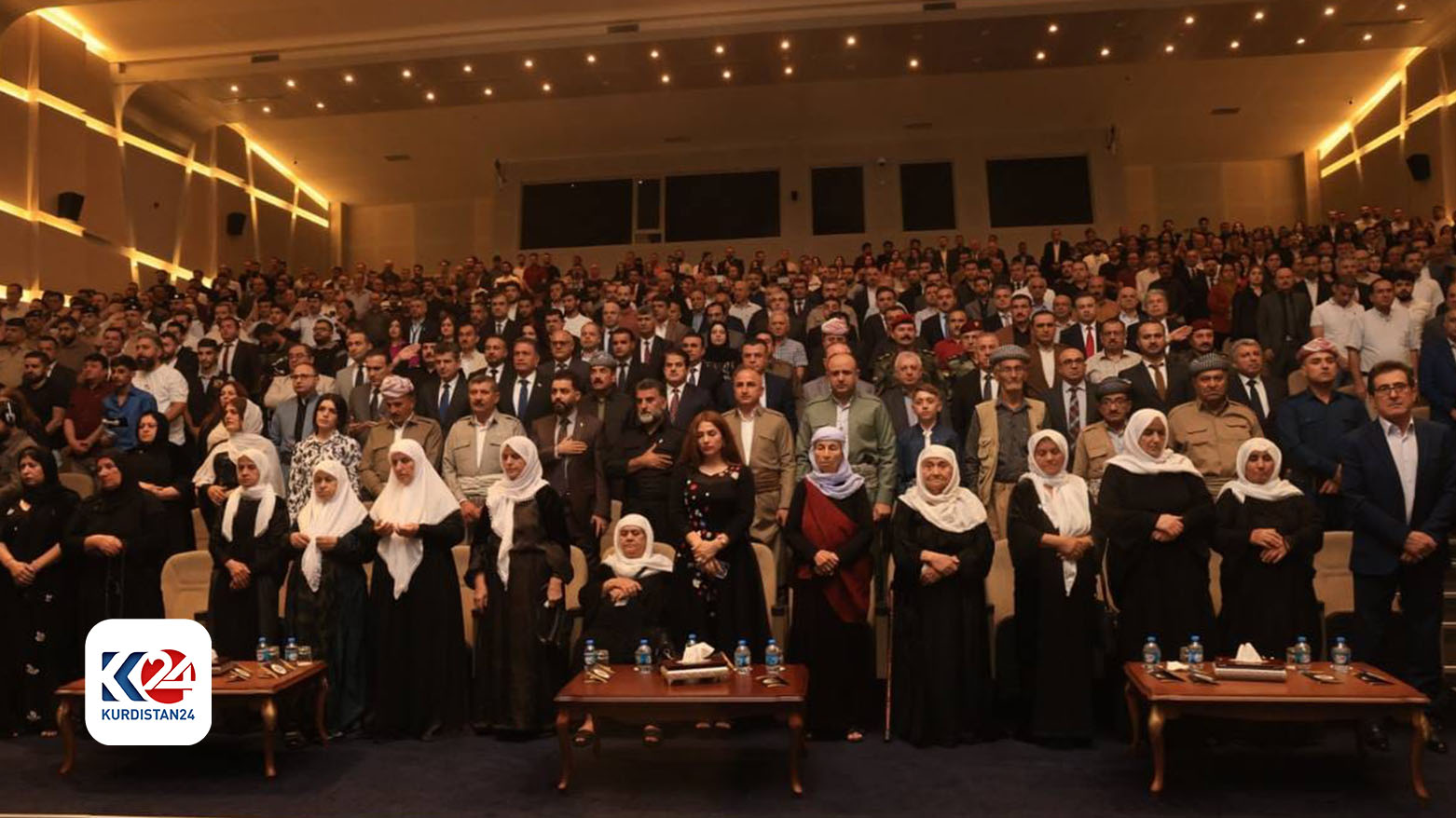36th anniversary of Badinan Anfal commemorated in Duhok with tribute to victims, their families
The commemoration included the screening of a documentary film depicting the horrors of the Anfal campaign, followed by the symbolic lighting of 36 candles, each representing a year since the tragedy occurred.

ERBIL (Kurdistan24) – The 36th anniversary of the Badinan Anfal was solemnly commemorated in Duhok on Sunday in the presence of the victims' relatives and local dignitaries.
The ceremony, held under the supervision of Duhok Governor Ali Tatar, saw participation from Sarbast Lazgin, Head of the Kurdistan Democratic Party (KDP) Organization in Duhok, and Nawzad Abdullah, Head of the KDP’s First Branch in Duhok.
The event took place in the conference hall of Duhok province, marking a significant moment of reflection on the atrocities committed against the Kurdish people.
In his opening remarks, Jiyan Mustafa, Director General of Martyrs and Anfal Victims in Duhok, highlighted the heinous crimes carried out by the Ba'ath regime against the people of Badinan 36 years ago.
She emphasized the enduring pain and suffering that these crimes have left on the survivors and the community.
Governor Ali Tatar addressed the audience, describing the Badinan Anfal and the preceding seven stages of the Anfal campaign as major crimes against the Kurdish people by the Ba'ath regime.
He stressed the ongoing tragedy of the many victims whose remains have yet to be found.
In response to the families’ requests, Governor Tatar announced plans to establish a national museum dedicated to the Anfal crimes, ensuring that these atrocities will never be forgotten.
The commemoration included the screening of a documentary film depicting the horrors of the Anfal campaign, followed by the symbolic lighting of 36 candles, each representing a year since the tragedy occurred.
The event served as a poignant reminder of the past and a call to honor the memory of the victims by preserving their stories for future generations.
On Sunday and in a solemn address commemorating the 36th anniversary of the Anfal genocide in Badinan, the Kurdistan Democratic Party (KDP) President Masoud Barzani reiterated the Kurdish nation's unwavering demand for justice and recognition of their suffering.
Earlier on Sunday, on the somber occasion of the 36th anniversary of the Anfal Campaign in Badinan, Kurdistan Region Prime Minister Masrour Barzani issued a heartfelt message honoring the victims, survivors, and families affected by the brutal genocide.
36 years ago, the Ba'ath regime destroyed hundreds of villages in the Badinan area.
— Masrour Barzani (@masrourbarzani) August 25, 2024
Thousands were killed, and tens of thousands were robbed of their homes and livelihoods.
Today, we honor the victims. pic.twitter.com/uN0el5IGcl
Read More: PM Masrour Barzani commemorates 36th anniversary of Badinan Anfal, calls for reparations
On Sunday, the Kurdistan Region’s President Nechirvan Barzani issued a poignant statement on the 36th anniversary of the Anfal campaign in Badinan, a tragic period between August 25 and September 6, 1988, marking the final phase of the Anfal genocide.
Today, on the 36th anniversary of the Anfal campaign in Badinan, we stand united in remembrance of the 182,000 innocent lives lost to one of the most heinous acts of genocide in modern history by the former Iraqi regime. The brutality inflicted upon our people during those dark…
— Nechirvan Barzani (@IKRPresident) August 25, 2024
On August 25, 1988, the Ba'athist regime unleashed its wrath on the villages of Mount Gara, subjecting them to relentless bombing and chemical attacks. The picturesque villages of Spidar on the outskirts of Mount Gara, Bawerka, Kevre, Meze, Spindar, Garago, Zeweshkan, Zarke, Sartke, Suware, Avok, and countless others were scarred by the horrors of war.
In the early hours of August 25th, airstrikes targeted the villages of Burjin, Hesi, Kharabiya, and Yakmala in the Zawita and Barwari districts, situated across the Khabur River. While the bombing caused destruction, the impact was less severe compared to a chemical attack. This is attributed to the Peshmerga's prior dissemination of awareness and preventive measures. However, the attacks resulted in the loss of livestock, damage to gardens, and the contamination of farmland due to toxic gases.
The Badinan Anfal, spanning from August 25 to September 6, 1988, encompassed a vast region along the Iraq-Turkey border and the depths of Duhok province. 76 different regions saw the brutal Anfal campaign and nearly 700 villages in Zakho, Shekhan, Amedi, Akre, Semel, and the centre of Duhok province were destroyed. Official Ba'athist documents reveal the involvement of the 5th Regiment of the Iraqi Army and other military units in this systematic genocide.
The human cost was devastating. According to records, 13,553 individuals were arrested and disappeared, while hundreds more were martyred or injured in the bombings and chemical attacks. The total number of victims is estimated to be over 14,000, including 3,373 women and 6,964 children. Additionally, 1,500 people remain missing, and 85,000 were displaced from their homes, many seeking refuge across the border in North Kurdistan and Turkey.
Read More: 36 Years On: Unhealed Wounds of Badinan Anfal
Tragically, the Turkish government initially refused to provide shelter to the fleeing refugees, and some were even handed back to the Ba'athist regime. Those who managed to cross the border faced dire conditions, denied access to humanitarian aid and media scrutiny, while some were allegedly poisoned in a joint act of cruelty by Ba'athist and Turkish officials.